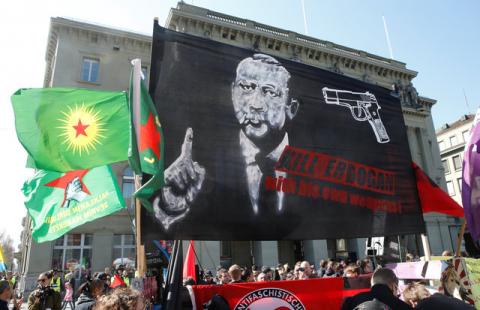Advertisement
Swiss investigate protest sign calling for Erdogan's killing
ZURICH (Reuters) - Swiss prosecutors are investigating whether a protest sign calling for the killing of Turkish President Tayyip Erdogan violated laws against inciting violence, police said on Monday.
People demonstrating in Bern on Saturday against plans to extend Erdogan's powers held up a sign reading "Kill Erdogan with his own weapons" and pictured a pistol aimed at his head.
Turkey's foreign ministry summoned Swiss diplomats in Ankara, demanding legal action against people at the rally, which drew thousands including Kurdish demonstrators.
Erdogan himself, who has accused Germany and the Netherlands of Nazi-style tactics for preventing rallies supporting his proposed new powers - which are due to be put to a referendum next month - said Switzerland had gone even further.
"Their leftist parties and the terrorists ... have come together and carried out a march ... In the Swiss parliament, they hang my picture with a gun to my head," he said.
Bern police spokesman Dominik Jaeggi said prosecutors would determine whether Swiss law was violated by the sign, which police had not confiscated at the event.
"Police did not actively intervene in the demonstration," Jaeggi said. "We confirmed the existence of the protest banner."
The Turkish foreign ministry says the protest was organized by the outlawed Kurdistan Workers Party (PKK), designated a terrorist organization by Turkey, the European Union and the United States, but not by Switzerland.
An email announcing Saturday's demonstration listed numerous groups supporting the event, including the Social Democratic Party, Switzerland's second-biggest political party, as well as the Kurdish-Turkish-Swiss Cultural Association - but not the PKK.
A spokesman for the Social Democrats distanced the party from the sign, saying a splinter group not associated with the organizers had displayed it.
Turkey has got caught up in a war of words with European powers who have blocked Ankara's efforts to hold rallies in their territories to persuade Turkish expatriates to vote for the new powers at the April referendum.
The Swiss foreign minister told his Turkish counterpart last week that Bern would "rigorously investigate" any illegal spying by Ankara on expatriate Turks before the referendum.
Germany and the Netherlands, both home to many expatriate Turks with the right to vote in the referendum, have said the decision to ban several planned rallies was taken on security grounds and was not politically motivated.
(Reporting by John Miller; Editing by Andrew Heavens)



















Add new comment